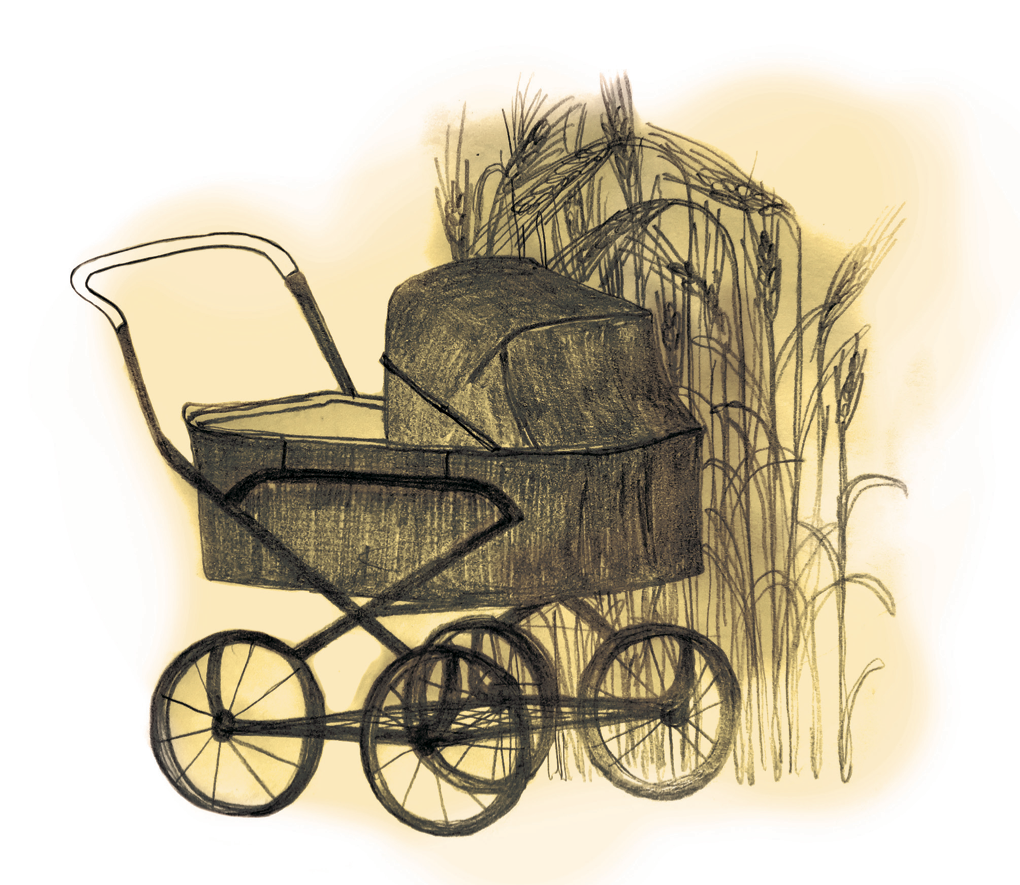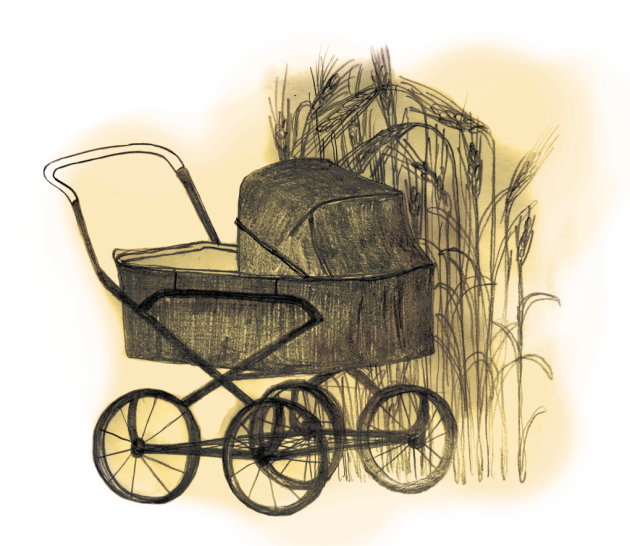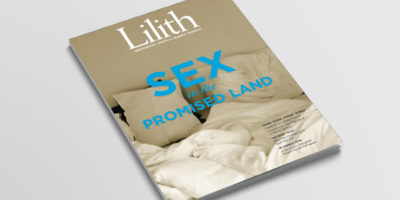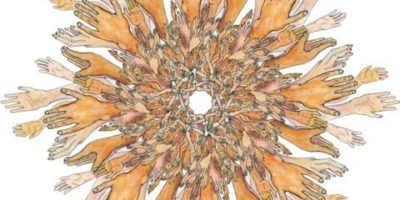
La Poussette
Winner of our fiction contest.

Illustration by Hila Peleg
Sylvie Beauchard has been cooking since dawn. Her in-laws will be here shortly, so despite her fatigue, she is brisk in the dining room, snapping down the linens and cutlery. The wine glasses she places carefully by the plates. The green stems make her think of tulips and she wishes she had some for a vase. It is too early for flowers and besides, she chides herself, she has what she has most wished for.
She has planned the exact way to tell Charles’ parents about their grandchild. Charles has agreed to her plan, though he’d prefer to tell them straight away. After the meal, Sylvie will suggest the front room for dessert. (The hazelnut torte is indeed the reason for rising before dawn. It has layers and filling and a frosting made glossy and smooth by her hand.) Once seated, she will take out her knitting — a tiny sweater in the palest blue. How long before they notice what she is making? With her father-in-law it could be hours. He’ll start in with news of the Occupied Zone, then move on to the price of petrol in Nîmes, but Mother will notice. She will raise her eyebrows, gather her lips, a look Sylvie finds fearsome, though it is Mother’s most common expression. She will demand to know what Sylvie is doing and why. And then they can tell her, watch her impatience and annoyance turn to pleasure, maybe even pride, who knows? But Sylvie has gotten ahead of herself. There is still work to be done before they arrive.
From the window over her sink, Sylvie can see the tenants in the next farm over out in the orchards. It had pleased her at first to think of the farm being inhabited again. Then she saw the tenants in town with their city clothes and manners. The woman’s skirt had pleats in the back that flipped up when she walked. They weren’t farmers, she thought then, and sure enough, Charles had found their cow in his pasture. When he took it back he’d found them reading books. Books about farming! Who knew such a thing existed? Were there also books about walking? he’d asked Sylvie. Taking a leak in the woods? That was weeks ago, and still Sylvie will hear him laughing in the other room.
And now, here he is, stomping his feet outside the door to get the dirt off them as she has taught him.
“The wine,” she says when he is in.
“Yes, yes.”
He is not one to be rushed, Sylvie knows, but he wants the dinner to go well, too. A son would make his life easier, but Sylvie cannot help herself; she wants a girl.
“I’m hungry,” he says. “It is ready?”
He’s been up for hours too. Outside the dogs — Sammi and Bruno — bark their excited welcome. They are good dogs, loyal and affectionate, fine company when Charles is gone. Over the barking she can hear the truck sputter and grind on its ascent. Sylvie tucks a loose strand of hair behind her ear. There isn’t time to change into a fresh apron. Pity.
“Bienvenue!” Sylvie calls to her in-laws, “Come in!”
“Please,” Mother Beauchard says, “I’m not the Queen, just an old woman.” She pecks Charles on each cheek. Her fingers grip Sylvie’s shoulders as she pulls her in for her kisses. There is nothing frail in her touch.
“Where is Papa?” Charles asks, taking her coat and kerchief.
“With your beasts,” she says. “He brought them bones.”
“He’s sweet on those two,” Charles says.
“Just two more mouths to feed, that’s all they are,” Mother says.
Sylvie knows where this conversation is going: they spoil the dogs, treat them like children. If they had children they’d see how foolish they look.
“That yarn is lovely,” Sylvie says, reaching for Mother’s arm in a new sweater.
“I traded plenty for the wool,” Mother says.
“A good color on you.”
Mother says nothing, but Sylvie can tell she is pleased. She puffs up like the tawny poule before she lays.
Father Beauchard has been drinking already. He’s mild and affectionate when he drinks, no trouble. He might grow mushy at their news, but that isn’t a crime, no not at all.
“Father,” she says kissing him. She smells the wine on his breath — warm and briney against her cheek.
“Shall we sit down?”
“Yes, please.”
“Such fuss for family,” Mother says, taking in the tablecloth, the good glasses.
“Never mind,” says Father, “never mind.”
Charles tries to catch her eye. He’d like to blurt their news, to stave off his mother’s relentless crabbing, but Sylvie won’t look. She must get the roast from the stovetop where it cools. The juices will make a tasty gravy, thickened just a bit with flour, a touch of wine. And then the dogs are barking again.
“Such a nuisance,” Mother says, smug, her opinion confirmed.
There is a rap at the door and through the kitchen window, Sylvie sees it is the neighbors. At this time? Everywhere families are sitting down to Sunday supper. Father is liable to invite them in, tell them the history of this house, the village. His favorite is the story about their region being the model for Heaven, such is its charm. Between her mother-in-law’s sourness and this interruption, Sylvie’s high hopes for the day plummet.
She opens the door. “Oui?” Two men stand before her, their round spectacles making their eyes look particularly inquisitive. With them is the woman in her pleated skirt. This time she has a baby carriage with her, and in the carriage, a little girl with wispy dark curls, the kind Sylvie would like to smooth with her hand. Sharply, the child turns her head from Sylvie’s gaze.
“Good afternoon,” the taller man says. His dark hair is brushed back from a high forehead. “We’re your neighbors.” Sylvie catches a whiff of something foreign in his speech.
“Oui,” Sylvie says again.
“We were hoping to speak with you regarding — ”
But then Father Beauchard is calling from the other room, “Come in! Bienvenue!” Sylvie opens the door wider, so they can all enter. The shorter man lifts the carriage over the stone threshold, and then the child is removed. She goes to the woman, tugs on her skirt to be lifted. Once on her hip, she buries her face in the woman’s shoulder. In the past, such a display would’ve pained Sylvie.
“We’ve interrupted you,” the woman says, seeing the table. “We’ll not bother you long.”
“No bother, no bother,” says Charles.
“We must inquire,” says the shorter man. “If you have any food you would sell. You see, the farm isn’t yet producing.”
“No,” says Sylvie, before Charles can answer. She wants them to leave tout de suite so she can resume her cooking, proceed to the announcement, the celebratory cake. She tries to usher the neighbors towards the door again. She sees that during this interruption, the potatoes have boiled over, leaving starchy ribbons down the side of the big pot.
“Potatoes,” says the woman.
“For the pigs,” Sylvie says.
“Would you consider for the child?” Lise says. “She is growing.”
The child has round cheeks, legs like sausages. Even her fingers are pudgy. Is she pale? Perhaps, but it is that time of year. The child stares at her, her dark eyes appraising, it seems.
“We must take care of our own,” Sylvie says, averting her eyes.
“You know about the market on Tuesday?” Charles says. “Some will barter there.”
Sylvie watches the woman return the child to her stroller. It’s a stylish little poussette with big wheels, a navy awning and seat with a sturdy basket beneath. She has seen these only in magazines. And though there are no sidewalks or gardens or parks in which to push a poussette, Sylvie must have it. Why should this baby have one and not hers?
“Wait,” she says. “I’ve forgotten the barley.” Neither she nor Charles care for it. But these people can’t be choosy, even with their fancy ways.
“For the poussette,” she says, “a hundred kilos.”
“Ridiculous,” says Mother Beauchard.
The child is being lifted out, her fat little legs kicking. From under the seat, a blanket is removed. “Et voilà,” says the shorter of the men.
“What do you need with that?” Mother Beauchard says.
Sylvie doesn’t care what Mother thinks. She steers the poussette past her frowning mother-in-law, out of the kitchen smelling of burnt meat and into the front parlor.
Charles has brought up the barley. The men each lift a burlap sack, hoist it on their shoulders, and take off down the hill.
“I’ll bring the rest around after midi,” Charles says.
“Well,” says Father Beauchard, “Where were we?”
“Mother,” Sylvie says, cupping her belly, “have you not guessed it? We are having a child.”
“Bravo!” says her father-in-law. “Congratulations to the both of you — and to us as well — a grandchild!”
When Sylvie looks to Mother Beauchard, she sees that she is smiling. Is it possible that her eyes are wet? Later, Sylvie will remember this door opening between them, approval like a light shining on her. This hadn’t been her plan, but it has worked out. Even the meat is fine, not over-cooked as she feared. They eat well, sopping up the juices with the crusty bread and nearly polishing off the cake.
Lise hasn’t seen such plenty since before the war. There’d been a fat, golden loaf on the breadboard, meat crackling in the oven, a cake with chocolate frosting, hazelnuts circling the top. She had expected the woman to offer some to Eugenie. How long since the child has had a sweet? Where Lise is from, guests are a blessing. They are ushered in, fed the last morsel, given the best seat at the table.
But Palestine seems not just far away to her; it is from another time, some distant past. There is so much here that her parents would dislike or misunderstand — the young couples walking arm in arm, Lise’s own calf-baring skirts, the crisp greetings in the shops and offices down town.
March 13, 1941
Très chers,
At present, we are living in the Vaucluse region. The farm has cherry orchards and almond trees already established and we have planted potatoes and wheat. Until then, we have barley, which our neighbors grow in abundance. Besides crops, we have chickens and a cow, so we have milk for the child and cheese and butter. Eugenie delights in the open space here and grows like a mushroom.
Kisses to all of you, from all of us.
Lise
Of barley, one can say this: it is versatile. Lise makes porridge with it for breakfast. She roasts the kernels and makes a kind of coffee. Adding the first scraggly vegetables and wild garlic, she makes soup. She grinds it into flour and makes bread and cake, adding cherries from the orchard once they ripen. They don’t go hungry, but she will never eat barley again after the war. Just the smell of it cooking will turn her stomach.
By June, Alain and Jean have mapped the property and cleared a spot for planes to land. What they will bring or take away — food? Ammunitions? People? Her brother and husband speak of this after supper while she cleans, puts Eugenie to bed. So often, she thinks, since the war began, she can do nothing about what most troubles her. She can’t bear not to act either, so she cleans the crumbling stone floor, tidies the shelves. This activity both occupies and distracts, though not indefinitely,
not perfectly.
Sometimes she knits while they talk, counting stitches, rows. She hears them, but doesn’t. This is the other discovery she makes during this time — the mind can know and not, hold apart certain facts where they aren’t as bothersome.
She is making a cardigan for Eugenie from wool that was a sweater of Jean’s before he tore the sleeve on a fence. It’s rough yarn, too scratchy for a child, but it will keep out the cold. Eugenie is a good girl, as if she knows she mustn’t complain. What will be the cost of all this early and necessary compliance, Lise wonders. There is too much to do for Lise to consider this long. And then her brother is gone to Lyon where he does God knows what. Each time he returns she is afraid it will be the last time she sees him. He and Jean speak late into the night, and she cannot bear their murmurs.
When it happens, Charles has gone to the mill in Avignon. Sylvie is in the pantry gathering ingredients for a tart when a cramp seizes her, a knife so sharp that she clutches that place she knows only as down there. Through the layers of dress and apron, she feels the dampness. It’s too early for this. Pas encore, she whispers, as if hushing a baby back to sleep. Pas encore. She cannot remember when she last felt the baby moving inside her — was it last night? This morning before the milking? Then she can think of nothing but the hot, rude pain.
When Charles returns, it is over. The blood and mess have been disposed of, the floor mopped clean. He comes home smelling of wheat and wine and is slow to understand when Sylvie tells him the baby is gone.
As soon as he entered, the doctor gave Sylvie a tablet to swallow. She would like to sleep for a long time, but after the examination, the doctor insists on talking to her. Charles, in his muddy work boots, stands by the bed. When he leaves, there will be two discrete piles of dirt on the bedroom floor.
“The womb,” the doctor says, “is a vessel.” He picks up the glass beside the bed to illustrate. “Yours is tilted, Madame. Like this.”
Sylvie turns her head into the pillow. The bedding smells sour to her.
“You must accept, Madame.”
Sylvie can hear Charles shuffling, grinding the dirt into her floor. So much mess, she thinks.
“I recommend rest,” the doctor says, “and quiet.”
“Yes, yes, of course,” Charles says.
Sylvie keeps her face in the pillow even after she hears the door click shut behind them. She hears their voices in the next room, but their words seem not to adhere one to another. Then it is quiet. A breeze comes through the open window.
How many days pass in this manner? Tea and bread, then sleep. Soup and more sleep. One day after the bleeding has at last stopped, she feels well enough to sit up and knit, but the discovery of the small yellow bonnet, nearly completed on her needles, sets her back. Should she unravel all her hard work? The yarn is good cotton, but what to do with it, she cannot imagine. She sets it on the pillow, lies down. Then from the window, happy shrieking, peals of laughter. It’s the girl with the dark curls. Sylvie rises and goes to the window. She can see the child running from one of the men, laughing. The man sings as he scoops her up and she shrieks again. Sylvie shuts the window, pulls closed the curtain. Still the noise seeps in: piercing, ruinous. She knows what she must do. Hasn’t the doctor insisted on quiet?
At Hôtel de Ville, Sylvie is made timid by all the movement, the brisk efficiency of high heels clacking over the tiled floor and the voices echoing up into the high ceiling. The entry way smells of rain and cigarettes. Thank goodness there is a placard by the entrance. What will she say to Monsieur Gilbert? How does she know they are Jews? Their speech, the dark hair, spectacles — don’t Jews always have poor eyesight?
As it turns out, she needn’t have proof. Any suspicion is sufficient. Monsieur Gilbert thanks her and moves her quickly along. He’d rather spend his time practicing boule than worrying about Jews, but there is pressure from Paris. Still, he thinks, he will play his match after lunch as he intended, before sending out the gendarmes.
Mid-morning, while Lise knits, there is a knock at the door. This could be any number of things — the cow in the neighbors’ field again, or a peddler, but Lise knows it is something more. She watches Jean at the door, combing his hair back with his hand as he listens. The man who has been sent to warn them is no one she knows, but that is to be expected. “You must hurry,” he says. Before the door is closed, she is gathering their things — clothes, books, papers. A sack of barley cakes and the first almonds from the trees. They’re on a train to Lyon before dark.
August 12, 1941
Bien chers tous,
By the time you read this, we will be in our new town. Alain promises it is a good place. Jean will find work in a lab. Alain assures of this as well. I imagine there will be parks for Eugenie with paths we can wander.
She stops writing for a moment, remembering the stroller. Is it growing easier, this leaving and discarding? She cannot even remember all she has left or abandoned, so it’s funny that she will remember the stroller for a long time. Beside her, Eugenie sleeps, her cloth doll in her arms. Lise leans her forehead against the glass. In the last light, the fields outside gleam. She must finish her letter, so she can post it at the next station.
Perhaps when you read this, we will be sitting down to supper in our new apartment. Think of us there — safe and together and missing you.
Lise
When Charles mentions the neighbors’ sudden departure, Sylvie shrugs, continues her polishing. She tells no one what she has done — not Charles or her in-laws. Several times that warm fall when she opens the windows, she imagines she hears the girl calling out or singing. But no, it’s only the wind sifting through the leaves on the larch trees, and farther off, Charles cutting hay.
The baby carriage and the layette of gowns and sweaters she’d assembled were taken away while she convalesced. For this, Sylvie is grateful. The dogs are gone, too, and though she doesn’t ask about them, for a long time she will expect their sharp, energetic barks, the frantic swinging of their tails as she moves about the yard.
Rachel Hall’s short stories and essays have been published in numerous literary journals and anthologies. “La Poussette” is part of her collection of linked stories, Heirlooms, selected by Marge Piercy for the G.S. Sharat Chandra Book Prize. Heirlooms will be published in fall 2016 by BkMk Press.



